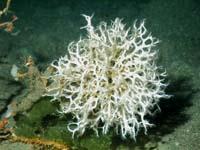Color lost, alive

Corals die when they lose color. But not always. Some species can survive by reestablishing conditions.
Corals have color because they have some adhered photosynthetic algae. These algae absorb energy from light and get the nutrients that coral needs. The coral itself is built by a polyp, offering a support in exchange for the foods obtained by the algae. But if the water temperature rises, the algae are released. The corals are peeled and as they do not get food die.
But not always. Several American biologists returned to the sea artificially bleached corals to their place of origin and resurrected corals. This resurrection occurs only with some species. The key is in the coral polyp. When they do not have glued carob, they have to consume five times more plankton, but do not die. They survive.





